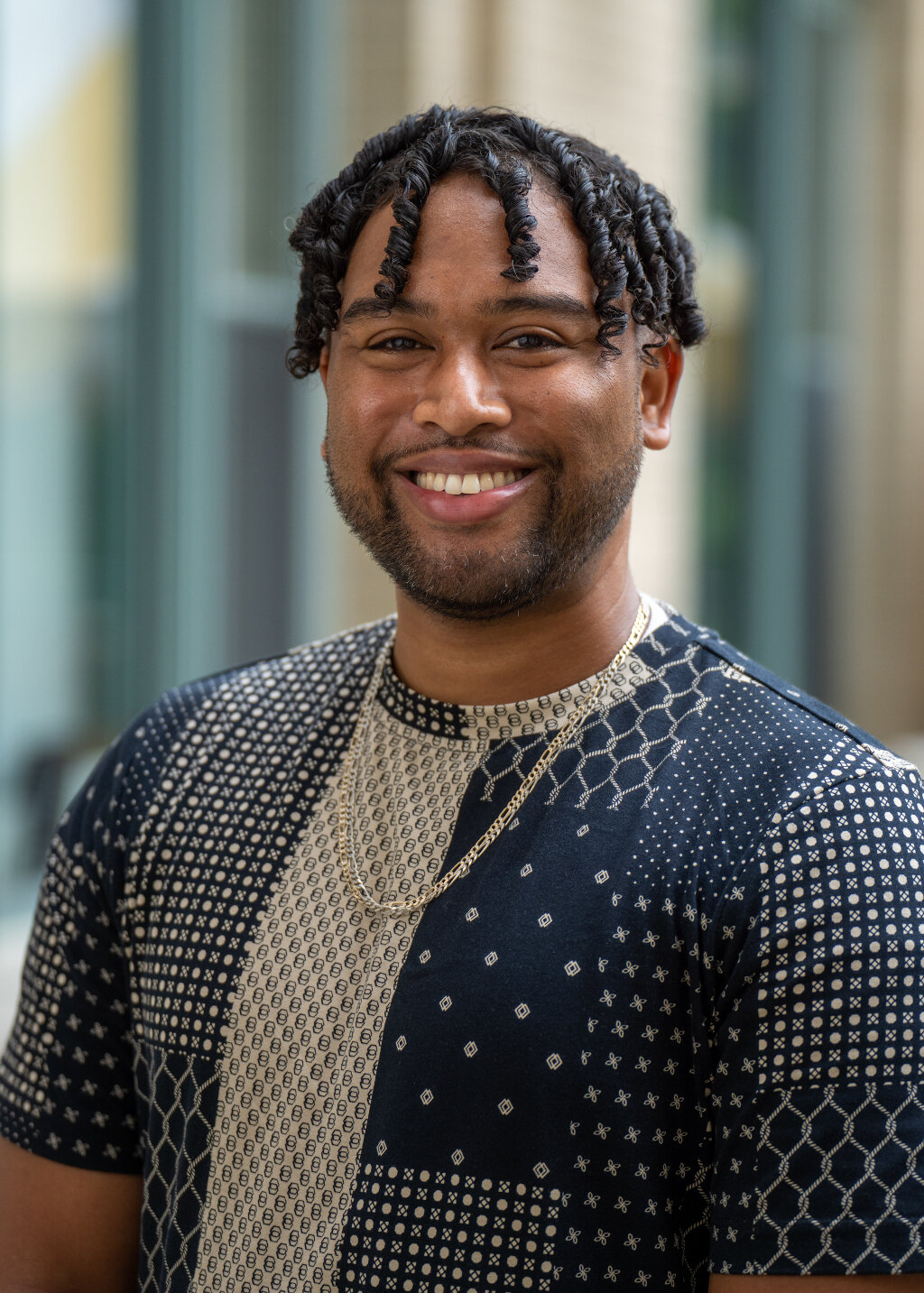Portrait of Kevin Jarbo (September 2021)
Peace and greetings!
I am an Assistant Professor in the Social and Decision Sciences Department at Carnegie Mellon University.
I also co-direct the Data-Driven Diversity (D3) Lab in the Dietrich College of Humanities and Social Sciences.
A bit about me…
After completing an undergraduate degree in biological sciences at the University of Pittsburgh, I went into human brain imaging research and later earned my PhD in psychology and cognitive neuroscience at CMU in 2018. I joined SDS as a President’s Postdoctoral Fellow before starting my faculty position.
My primary research focuses on how the social and psychological factors that influence students’ decisions to seek (or avoid) help after facing academic challenges and setbacks. More broadly, I am interested in empirical research and institutional data analysis regarding college students’ experiences with academic and social belonging.
I also primarily teach a 1st-year undergraduate seminar course 66133 We’re Not Beyond Race: Race and Identity in the US and a mixed undergraduate/graduate-level course 88302/88602 Behavioral Decision Making. In 2024, I developed and taught for the first time two course: 88285/88685 Deconstructing and Dismantling Discrimination and a pre-college proseminar 99106 From Student to Scholar for the Summer Academy in Math and Science (SAMS) program at CMU.
A little bit more about me…
I have also worked in CMU’s Center for Student Diversity and Inclusion where my efforts centered on the experiences and development of Black men in college.
Since 2020, I have volunteered as the Program Chair for the Annual Pittsburgh Racial Justice Summit. In this role, I lead the summit’s planning committee in conceiving and developing the theme for each summit, selecting and inviting keynote and panelist speakers and workshop facilitators, evaluating workshop session proposals, coordinating the schedule of events, and delivering remarks throughout the day of the summit.
For folks who are seeking training on equity and inclusion in the workplace, I am a Certified Trainer licensed to facilitate workshops using Paloma Medina’s Neurology of Equity and Inclusion for Systemic Change program. I’m more than happy to connect with anyone interested in learning more!
Other than that, I am a sneaker enthusiast with probably too many pairs of sneakers, boots and dress shoes included. I love sneakers and I appreciate them as a form of artistic expression and projection of my style and personal values.
My Current Research Projects
Moments@Work
Can a gamified, low-stakes intervention increase people’s willingness to discuss and confront workplace bias and discrimination?
Abstract Workplace discrimination due to biases is widespread in society. Unfortunately, the explicit nature of most diversity training approaches can trigger resistance and defensiveness, undercutting their bias reduction goals. Recent research suggests that subtle, naturalistic interventions may be more promising. The present work investigated this approach, using the game Moments@Work, to examine whether players would be sensitized or desensitized to norms regarding workplace bias. Participants interacted with bots that showed consistent behavior and responded to scenarios by submitting reactions. They were randomly assigned to play against a bot that favored offensive, responsible, or random reactions that served as a control. The results revealed that the participants’ behavior aligned closely with the bot behavior in both the offensive and responsible conditions. After the game, those in the responsible condition reported significantly higher internal motivation to respond without prejudice compared to those in the offensive condition. These findings highlight the potential of educational games to reinforce social norms and offer insight to improve workplace diversity training.
Abstract A key strategy to being successful in math is help-seeking. Much research has focused on how students seek help from teachers, but students also benefit from peer assistance. We analyzed conversations from eight focus groups related to students’ paths to success in math. We found that students frequently brought up peer interactions as critical to their success. Three emergent themes were: support versus comparison, balance of effort within study groups, and friends versus peers. Our findings qualitatively extend current research by highlighting key ideas that impact peer interactions, such as increased reluctance to seek help in larger classes. Our findings have implications for classroom and group structures, including encouraging peer help-seeking and help-giving, as well as addressing belonging and sense of community. Link to conference proceeding paper.
Understanding the Impact of Stereotype Threat on Academic Help-Seeking and Procrastination
How do identity-threatening social signals impact our future decision making and behavior?
Project Overview In this line of research, I seek to expand our understanding of stereotype threat effects by shifting focus from purely academic outcomes to the everyday decisions and behaviors of students from negatively stereotyped groups in academic settings. Specifically, students experiencing stereotype threat may choose not to seek help and increase procrastination in order to avoid potential threats to their identity. By leveraging widely used stereotype threat interventions that can affect the appraisal of identity-threatening situations to focus on benefits, rather than costs, I hope to promote student help seeking and reduce procrastination in academic contexts.
Across academia, relatively poor inclusion and retention of women and people from underrepresented racial groups (URG; e.g., Black, Hispanic or Latinx) in STEM fields poses a major challenge for society, effectively excluding historically marginalized groups of people from high earning professional careers. Given widespread negative stereotypes about the academic ability of women and URGs, a Black student might opt to skip a white professor’s office hours, or a female student might drop out of a degree program once finding she is the only woman in any of her classes.
Stereotype threat can lead to avoidant behavior wherein a person may become reluctant, or even refuse, to engage in common social interactions because they may worry about confirming, or being judged in light of, a negative stereotype about a group with which they identify. Even worse, negatively stereotyped students may experience stereotype threat regularly, like microaggressions and microinvalidations, and its detrimental effects can persist after a single threat to affect more than just academic outcomes, but academically relevant decision making and behavior as well.
The model depicted above shows a potential mechanism that explains how stereotype threat can increase avoidance during decision making processes that ultimately lead to avoidant behaviors, like decreased help seeking and increased procrastination, in order to avoid potentially negative social experiences and emotions. If stereotype threat does function in this way, then I also hope to show that reliable and widely used stereotype threat interventions can shift student’s appraisals of threat. By emphasizing the benefits over the costs of a potentially identity-threatening situation, students may become more willing to seek help and procrastinate less in academic scenarios.
This project is currently in progress and funded by the Russell Sage Foundation.
Context, Costs, and Uncertainty Drive Loss Avoidance
How does context impact our behavior when we make risky decisions?
Project Summary This line of research builds on my PhD work to investigate how uncertainty and risk during decision making leads to avoidant behavior. With my colleagues Rory Flemming and Dr. Tim Verstynen, I developed a novel spatial decision making task called “Danger Zone” where participants had to use a computer mouse to select the center of a target to score as many points as possible while avoiding a nearby non-target that was associated with a penalty. In one study, we showed that increasing uncertainty–making it harder to identify the center of the target–made people avoid the non-target significantly more.
Together with Dr. David Colaço and Dr. Tim Verstynen, I followed up Danger Zone by framing the task as a moral dilemma, “Drone Strike”, where participant selections corresponded to either executing a drone strike on enemies on a battlefield while allies were nearby or delivering ammunition to allies with enemies nearby. When executing a drone strike vs. delivering ammunition, this study showed that context also matters when people make decisions in risky contexts. Namely, people avoided the non-target more when they perceived the kind of loss on the task corresponded to the potential to harm allies on a drone strike rather than a failure to help allies on an ammunition delivery. Overall, given that we had people doing the exact same thing in the drone strike and ammunition delivery contexts (i.e., selecting the center of a visual target), what kind of loss people were avoiding also influenced how much they tried to avoid a potential loss.
The “Drone Strike” project was funded by the John Templeton Foundation through the Summer Seminars in Neuroscience and Philosophy (SSNAP) Fellowship Program at Duke University.
Read more about these studies here.
Investigating Links between Moral Disposition and Moral Action Behavior
Why don’t people actually act how they say they would when faced with a moral dilemma?
Project Overview Project description in progress. In the meantime, email me (kjarbo@cmu.edu) to learn more.
Exploring How Social Attitudes Affect Rule Application
How do our beliefs and biases influence inequitable judgments and decisions about others?
Project Overview Project description in progress. In the meantime, email me (kjarbo@cmu.edu) to learn more.
Ongoing Collaborations
Stereotype Threat Perseverance
Does the impact of experiencing an instance of stereotype threat persist over time and across situations?
Project Overview Project description in progress. In the meantime, email me (kjarbo@cmu.edu) to learn more.











